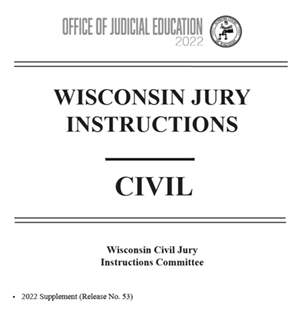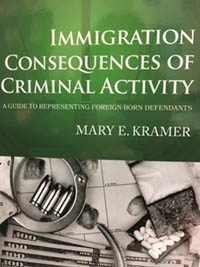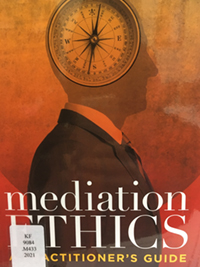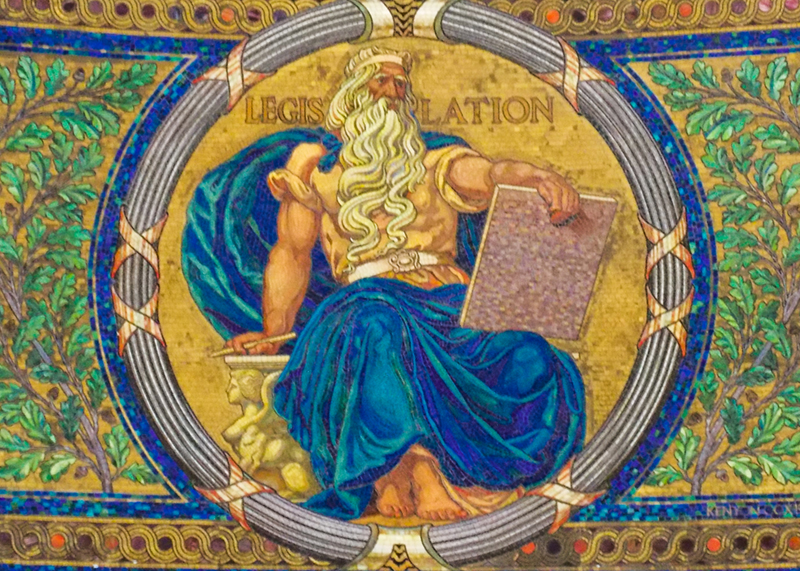WSLL @ Your Service April 2022
Contents
What’s in Your Research Bag? - Carol Hassler
If books are knowledge you can hold in your hand, then the hefty tomes of the law are knowledge you can best hold in the crook of your arm…or perhaps a sturdy bag! With the kickoff of National Library Week on April 4, you can now get a free canvas bookbag with every checkout at our libraries. (While supplies last.)

This National Library Week we're opening up our Lexis bookbags and talking about what you can read at our libraries.
Print Books
In his book On Writing, Steven King posits that, "books are a uniquely portable magic." This is certainly true of law books, which hold everything from primary law to analysis to extremely specific and wonderfully time-saving sample forms. Browse through this list of some of our many Lexis-published books in our catalog.
Check out these standalone, recently added books:
- Exculpatory evidence: the accused's constitutional right to introduce favorable evidence
- Veterans benefits manual
- What's it worth? a guide to personal injury awards and settlements
Lexis Advance
Supplementing our print offerings, get free access to Lexis Advance to Shepardize citations, research case law, and find journals or books including Nichols on eminent domain and Appleman on insurance. Use Lexis Advance on public computers at the David T. Prosser Jr. Library.
Lexis Digital Library
eBooks are easy to hold in your hand, and you can use them on any device. We've gone digital with eBook versions of popular Lexis titles. Log in to the Lexis Digital Library with your Wisconsin State Law Library card to read these books any time, anywhere. Titles include Employment in Wisconsin: Guide to Employment Law, Collier on Bankruptcy, Corbin on Contracts, Moore's Federal Practice, and more. If you don't have a library card, you can still use Lexis Digital using the public computers at our libraries.
We're excited to announce new eBook access for the following books! Can't make it to the library? No problem! Add these books to your virtual bookbag. All you need is a library card.
- Collier family law and the bankruptcy code
- Criminal practice
- Cross examination: science & techniques
- Eyewitness testimony
- Jurisdictions in civil actions
- Law of premises liability
- New Appleman on insurance law
- Prosecutorial misconduct
- State constitutional law
- Thompson on real property
- Warrens forms of agreements
- Waters & water rights
Stick with us all month, where we'll be blogging about some of our recent eBook additions and telling you how you can make the best use of your time with Lexis Digital Library.
Civil Jury Instructions Updated for 2022 - Carol Hassler
The most recent supplement to the Wisconsin Civil Jury Instructions has been approved by the Wisconsin Judicial Conference's Civil Jury Instructions Committee. The fifty-third supplement to this publication includes fifty-three new and updated instructions for the set. These updates reflect legislative actions and judicial decisions through January 21, 2022.
For information on the Committee's work, please contact Bryce Pierson at bryce.pierson@wicourts.gov.

New instructions
- 1393 Liability of a participant in a recreational activity
- 3079 Termination of easement by abandonment
- 7050A Involuntary Commitment: Mentally Ill: Recommitment Alleging Wis. Stat. 51.20(1)(am)(Released in late 2021 as an interim release)
Amended instructions
- 50 Preliminary Instruction: Before Trial
- 400 Spoliation: Inference
- 1008 Intoxication: Chemical Test Results [Reflects Changes in 2003 Wisconsin Act 30]
- 1023 Medical Negligence
- 1023.5 Professional Negligence: Legal-Status of Lawyer as a Specialist is Not in Dispute
- 1153 Right of Way: At Intersection with Through Highway
- 1155 Right of Way: At Intersections of Highways
- 1157 Right of Way: At Intersection of Highways: Ultimate Verdict Question
- 1158 Right of Way: To Pedestrian Crossing at Controlled Intersection (
- 1159 Right of Way: Pedestrian Control Signal: Walk Signal
- 1160 Right of Way: To Pedestrian at Intersections or Crosswalks on Divided Highways or Highways Provided with Safety Zones
- 1165 Right of Way: To Pedestrian at Uncontrolled Intersection or Crosswalk
- 1170 Right of Way: Blind Pedestrian on Highway
- 1175 Right of Way: Entering Highway from an Alley or Nonhighway Access Point
- 1180 Right of Way: Funeral Processions; Military Convoys
- 1185 Right of Way: Green Arrow
- 1190 Right of Way: Green Signal
- 1190.5 Plaintiff and Defendant Each Claims Green Light in Their Favor
- 1191 Duty of Driver Entering Intersection with Green Light in Driver's Favor: Lookout
- 1192 Duty of Driver Approaching Intersection When Amber Light Shows
- 1193 Red Traffic Control Light Signaling Stop
- 1193.5 Flashing Red Traffic Control Light
- 1195 Right of Way: Left Turn at Intersection
- 1205 Right of Way: Moving from Parked Position
- 1210 Right of Way: On Approach of Emergency Vehicle
- 1220 Right of Way: Pedestrian's Duty: At Pedestrian Control Signal
- 1225 Right of Way: Pedestrian's Duty: Crossing at Controlled Intersection or Crosswalk
- 1230 Right of Way: Pedestrian's Duty: Crossing Roadway at Point Other than Crosswalk
- 1235 Right of Way: Pedestrian's Duty: Divided Highways or Highways with Safety Zones
- 1240 Right of Way: Pedestrian's Duty: Facing Green Arrow
- 1245 Right of Way: Pedestrian's Duty: Facing Red Signal
- 1250 Right of Way: Pedestrian's Duty: Standing or Loitering on Highway
- 1255 Right of Way: Pedestrian's Duty: Standing or Loitering on Highway Crosswalk; Suddenly Leaving Curb or Place of Safety
- 1260 Position on Highway: Pedestrian's Duty; Walking on Highway
- 1265 Right of Way: Persons Working on Highway
- 1270 Right of Way: When Vehicle Using Alley or Nonhighway Access to Stop
- 1275 Right of Way: When Yield Sign Installed
- 1762 Personal Injuries: Future Loss of Earning Capacity
- 1900.4 Safe-Place Statute: Injury to Frequenter: Negligence of Employer or Owner of a Place of Employment
- 2600 Malicious Prosecution: Instituting a Criminal Proceeding
- 2605 Malicious Prosecution: Instituting a Civil Proceeding
- 2770 Wisconsin Fair Dealership Law: Good Cause for Termination, Cancellation, Nonrenewal, Failure to Renew, or Substantial Change in Competitive Circumstances (Wis. Stat. § 135.03)
- 2790 Trade Name Infringement
- 3028 Contracts Implied in Law (Unjust Enrichment)
- 3110 Insurance Contract: Definition of "Resident" or "Member of a Household"
- 7050 Involuntary Commitment: Mentally Ill
- 8025 Trespass: Owner's Duty to Trespasser; Duty to Child Trespasser (Attractive Nuisance)
- 8060 Adverse Possession Not Founded on Written Instrument (Wis. Stat. § 893.25)
- 8100 Eminent Domain: Fair Market Value (Total Taking)
- 8110 Eminent Domain: Change in Grade
- 8120 Eminent Domain: Comparable Sales Approach
The Library partners with the Office of Judicial Education to provide free access to the Wisconsin Jury Instructions on our website. While updated instructions can be downloaded at any time from our website, many readers may wish to keep their print sets up-to-date. To do so, download and print the fifty-third release. Blank pages have been inserted to make double sided printing easier. File new and updated instructions, along with the updated table of cases and index in your print set. A complete, printable file of all the current Civil Jury Instructions and finding aids is also available.
Legislative History Research - Beyond Drafting Files - Michael Keane
Researching legislative history is the exploration of the background of a statute, usually in search of documents that support a certain interpretation of the language. Facilitating a favorable interpretation of a statute can be as crucial in a given case or circumstance as identifying a favorable court precedent. In our November 2021 issue, we gave an overview of using drafting files for researching legislative history. This month we're focusing on a few other sources researchers may find helpful.

Legislative Council
In some instances, bills are not drafted by the normal legislative process, and other sources may be available for legislative history research. Some bills are drafted as a result of extensive study by Legislative Council study committees.
The Legislative Council, a legislative service agency that provides staffing support to study committees, often produces detailed reports and minutes documenting the activities of these committees. If a statute originated in one of these committees, these materials can be very useful in gaining background knowledge about the law and why certain language was chosen.
Materials from recent study committees are available at the Legislative Council's website: Study Committees (wisconsin.gov) The Wisconsin State Law Library is one of several libraries that have collections of materials from older Legislative Council study committees.
Supreme Court orders
Another class of legislation is law created by Wisconsin Supreme Court order. In these instances, the legislature has ceded law-making authority to the Supreme Court in matters pertaining to court procedure. Supreme Court Rule orders appear as citations in the history notes of statutes. Find Supreme Court Rule Orders online from around 1996-present or in the printed Wisconsin Reports.
In exercising this function, the Supreme Court has often relied on the advice of Judicial Council study committees. The Wisconsin State Law Library has an extensive collection of materials from these committees; the contents of this collection is described on our website: Judicial Council - Wisconsin State Law Library Additional archival collections can be viewed at the Wisconsin Historical Society library.
Become a legislative history pro
Have you taken our Introduction to Legislative History class yet? If not, April is the perfect time to take this free CLE webinar.
Introduction to Wisconsin Legislative History
Wednesday, April 6, 12:00 - 1:00 p.m.
Location - Live webinar - Register for Introduction to Wisconsin Legislative History
1 CLE credit applied forI need the legislative history of a Wisconsin statute. Where do I start? What do I do? Participants will look at the primary resources used to research Wisconsin legislative history, learn about the online Wisconsin legislative drafting files, and learn some helpful tips and tricks along the way. This introductory class covers basic research strategies and sources.
Registration is limited to 100. Registrations will be approved daily by the moderator. Once your registration is approved, you will get an email confirmation with connection information. Please reach out to carol.hassler@wicourts.gov with questions.
New Books - Kari Zelinka

New Edition! Immigration Consequences of Criminal Activity: a Guide to Representing Foreign-Born Defendants, 9th edition, by Mary E. Kramer, 2021
Call Number: KF 4842 .K73 2021
This book is lauded as a vital resource for immigration and criminal courts. If you are representing a non-citizen in criminal proceedings, start here. The newly updated, 9th ed of Immigration Consequences of Criminal Activity: a Guide to Representing Foreign-Born Defendants, has been updated with coverage of the latest law and policy from the courts and agencies affecting criminal immigration law. Check out the book today for a discussion of how non-citizens who are victims of criminal activity in the United States can obtain immigration benefits.
Topics include:
- Overview of basic immigration terms
- Consequences of criminal activity: removal from the United States
- Consequences of criminal activity: detention inside the United States
- Aggravated felonies
- Immigration defense: waivers and other relief
- Fashioning a plea to avoid adverse immigration consequences
- Visas and status for cooperating witness: S, T, and U
- Preparing and presenting applications that waive a criminal conviction

New Book! Mediation Ethics, a Practitioner's Guide, edited by Omar Shapira, 2021
Call Number: KF 9084 .M433 2021
Mediators practice in many settings including commercial, family, workplace, medical malpractice, and construction across the world, for disputes in and out of court. Many of these mediators are lawyers and they need to learn a new code of conduct and rules by which to practice. Fifteen experts in mediation contribute chapters to Mediation Ethics, a Practitioner's Guide. The chapters are organized chronologically in the order a mediation would follow, so if you don't want to delve into the whole process, you can hone in on your desired topic quickly. Check out this book today!
Chapters include:
- Contrasting lawyer ethics and mediator ethics: critical issues
- Understanding codes of conduct for mediators and MEAC opinions
- Meeting the parties separately
- Making proposals \
- Dealing with difficult parties
- Lawyer representation in mediation
- Switching hats in med-arb: the ethical choices required to protect process integrity
- The mediated agreement
- Mediation confidentiality: mediators as witnesses
- Disciplining mediators
- Continuing mediation ethics education
![]() See our latest New Titles list for a list of new books and other resources.
See our latest New Titles list for a list of new books and other resources.
For assistance in accessing these or other resources, please contact our Reference Desk.
Tech Tip - Heidi Yelk
Citing to Online Sources
Last month, Tech Tip reviewed the various obstacles to finding newspaper articles in a world with fast-moving news coverage and dynamic newspaper websites. This month, we highlight how to cite electronic sources and some tools to assist in proper Bluebook citation.
Revisions to the Bluebook have made citing to electronic sources more acceptable. In fact, Rule 16 states that online newspaper can replace citing to print newspapers. (University of Akron) This video from Harvard Law School Library demonstrates how simple it can be.
Bluebook rule 18 is used when citing to electronic sources, with a caveat that print is still preferred in many instances. How do you know when citing to electronic sources is an option? The chart on page 4 of this Georgetown University Law Center publication provides an excellent guide. For another look at Rule 18, see this summary from Northeastern University School of Law.
As you can see from these featured websites, law librarians write extensively about Bluebook citation. From ongoing coverage by the UW-Law School Library to this cite checking guide from Marquette's Eckstein Law Library, help is close at hand. When in doubt, ask a law librarian for help.Library News - Carol Hassler
Welcome new library associates!
In March we welcomed two new Library Associates: Dane County Law Library (DCLL) associate Sara Andrews and Milwaukee County Law Library (MCLL) associate Victor Hoel.
Sara joined DCLL in early March and has a Master's in Library and Information Science from the University of Wisconsin-Madison. In the past, she has worked at the University of Wisconsin Law Library and other campus libraries. Welcome, Sara!
Victor joined MCLL in late March. With years of experience as an educator and researcher, Victor looks forward to starting a career in libraries. Welcome, Victor!
Understand tax law in InsideTrack
In March, we published Legal Research 101: Finding Tax Law Resources in the State Bar of Wisconsin's InsideTrack. Get an overview of the main primary sources used in Federal and Wisconsin tax research, plus a quick survey of popular tax titles. We also talk about CCH AnswerConnect, which you can search for free any time with your Wisconsin State Law Library card!
National Library Week CLE Webinar
Introduction to Wisconsin Legislative History
Wednesday, April 6, 12:00 - 1:00 p.m.
Location - Live webinar - Register for Introduction to Wisconsin Legislative History
1 CLE credit applied for
I need the legislative history of a Wisconsin statute. Where do I start? What do I do? Participants will look at the primary resources used to research Wisconsin legislative history, learn about the online Wisconsin legislative drafting files, and learn some helpful tips and tricks along the way. This introductory class covers basic research strategies and sources.
Registration is limited to 100. Registrations will be approved daily by the moderator. Once your registration is approved, you will get an email confirmation with connection information. Please reach out to carol.hassler@wicourts.gov with questions.
April Snapshot

Legislation
Photo by Francis X. Sullivan
In keeping with our legislative theme, our featured photo this month continues Francis X. Sullivan's series of photos of the Capitol murals framing the first floor rotunda of the Wisconsin State Capitol. This month's photo is of one of four magnificent glass mosaics decorating the pendentives of the rotunda. Legislation, featured here, showcases a stylus and grand tablet and represents Wisconsin's legislative branch of government.
We are accepting snapshots! Do you have a photo highlighting libraries, attractions or points of historical interest? Send your photo to the editor at carol.hassler@wicourts.gov to be included in a future issue.
Comments Welcome!
- Contact Carol Hassler
608-266-1424
Keep Up With Current News
- Weekly updates with Library Highlights
 Subscribe to our Newsletter RSS Feed
Subscribe to our Newsletter RSS Feed
